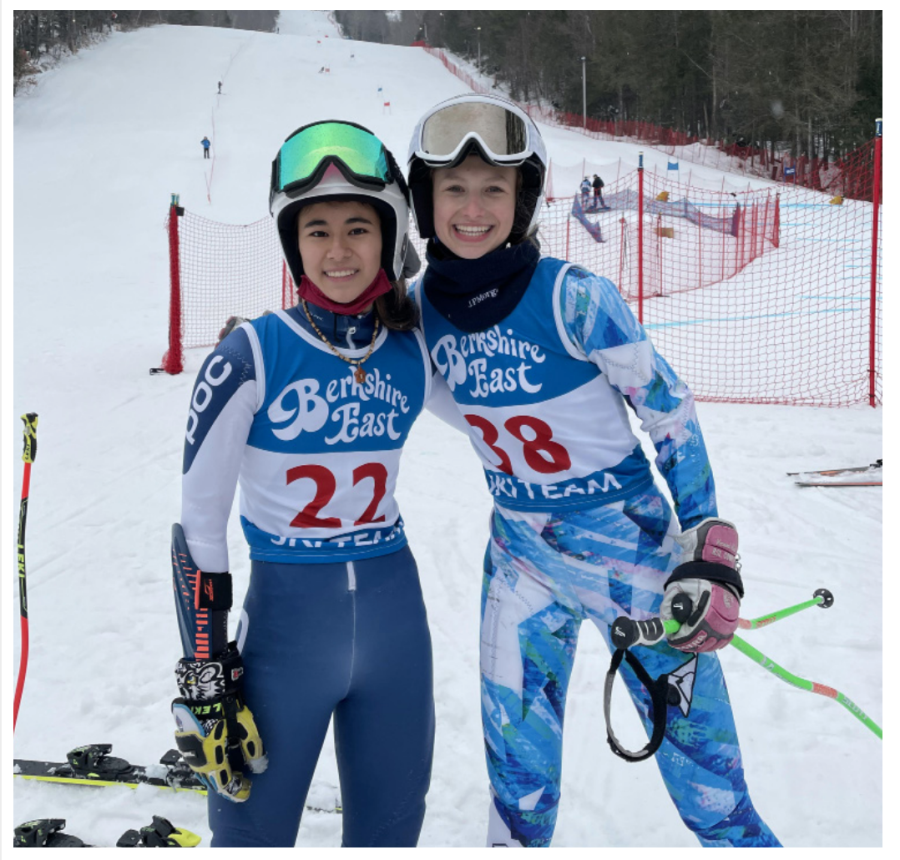Obscure Sports: Ski Ya Later!
April 7, 2023
Every weekend, two Poly seniors race to the mountains of Massachusetts, Upstate New York, and Connecticut to practice and compete on the slopes. Seniors Zoe Wells and Abbe Arnsten competitively ski in both the Giant Slalom and Slalom events.
“There are two different events. Giant Slalom and Slalom. Slalom is shorter skis and shorter turns, you have to punch the gates. Giant Slalom is faster, bigger turns, with bigger skis. I prefer slalom because hitting the gates is really satisfying,” wrote Wells in an email to the Polygon.
Both Wells and Arnsten start the day as early as five in the morning and race until around two in the afternoon. Those laborious days are overridden by their undeniable passion.
“My favorite part of the sport is the feeling of a perfect run, a perfect carve. The feeling of carving through a nice patch of ice, hitting the gate just right, it is so satisfying and so fun, knowing your hard work has paid off and your form is improving,” said Wells.
“Personally, I think that the friends I have made while skiing are my favorite part of the sport. Starting when you are eight years old I have essentially grown up with all of my friends as we skied together and have spent every winter weekend together up until this year,” added Arnsten.
Wells has been skiing since she was nine years old, since her parents introduced her and her brother to the sport. She then followed her cousin’s lead onto the race course and soon after, her little brother followed.
Skiing has been an essential part of Well’s upbringing, and balancing her time with both Varsity Soccer and Lacrosse during the school year makes her one of Poly’s most dedicated athletes. Wells, however, didn’t just “dive into the deep end” when she began racing; she started with interclub competition (a competition that is open to skiers from more than one club for a younger age group, before advancing to tri-state competition). She placed 3rd, 5th, and 7th, before moving up to tri-state competition racing for her U-16 team.
“You don’t actually get to ski the course before you run it, you inspect it, sliding through the gates, and then you’re just fighting hard to stay in the gates and look ahead. You have to finish with two clean runs, they set 2 different courses, and you can’t practice either beforehand,” said Wells.
Not only is the unpredictability of the course difficult, but the race itself brings a new set of challenges to the competition. “I wish more people knew how unforgiving it is. You have to have two clean finishes, you don’t get a re-run or something like that if you fall or miss a gate, unless there was something wrong with the course. I’ve had races where a majority of the girls fell or got disqualified and I got a high ranking, sometimes it becomes just about finishing. Even one mistake can cost you a second, and that second is the difference between first and 30th place.”
Although skiing may look glamorous, people often overlook the hardships racers face: hours of waiting in the cold, waking up at the break of dawn, and lugging around endless amounts of gear.
Skiing recreationally since the age of three, and joining the competitive sphere at eight, Arnsten’s childhood has revolved around the mountains.
Arnsten makes three hour car trips every weekend to ski. “Every weekend starting at the end of December and going until early March if the weather permits it. We compete at the surrounding mountains in Massachusetts as we are a part of the Tri-State Alpine Ski Racing Association,” she said.
Alongside Wells, Arnsten plays for Poly’s Varsity Soccer and Lacrosse teams. Participating in team sports on a day-to-day basis gives her a sense of both dependability and excitement, in contrast to the experience of skiing which is an individual sport.
“I find the fact that it is a very individual sport the most challenging part. Going through a race course is all on you to make the gate and go as fast as you can so when you fall or perform poorly it is easy to be really hard on yourself,” said Arnsten.
When racing, Arnsten always keeps in mind the technical aspect rather than the overall objective. “While yes the whole point of the sport is to get down the mountain the fastest it is also very technically challenging as each course that is set has its own obstacles and more challenging aspects. Therefore, being a good skier comes from not only being able to ski fast but also being technically skilled to perform well no matter the course.
Arnsten also started skiing from a young age and from familial encouragement. “My parents put both of my siblings into the race program at our mountain. Therefore, as the youngest child, I just followed suit. When I was old enough, I joined as well and it has just been something that has always been a part of my life.”
Not only does skiing require time and commitment, but there is a large amount of equipment that is required for each practice and race. In order to race, skiers need more than just a set of skis. They need a pair of race skis, shin guards, racing gloves, GS suits, racing boots, regulated helmets, tearaway pants, back guards, and racing poles just to compete!
Even though racing was an essential part of Arnsten’s childhood, last year she chose to retire from her racing days. Majority of her friends were off to college at this point making the decision slightly easier. However, her love for skiing is still strong. “ I recently stopped racing and now just do more coaching kids.”
Wells and Arnsten intend to pass down their passion for skiing to their own children and family, hoping to carry on the tradition for years to come.


























